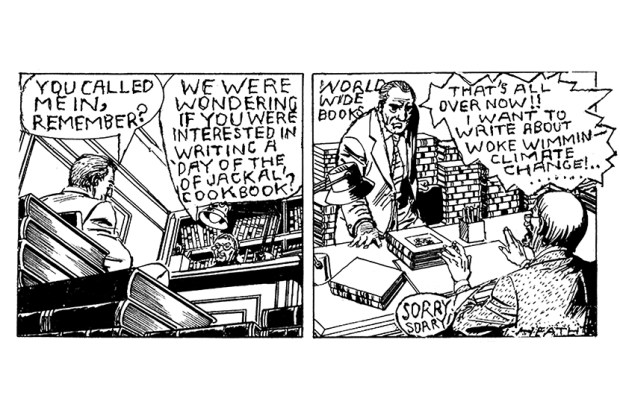The power of editors is comically overstated. I’m struck by the number of politicians who imagine that there’s a hierarchy: that editors shape the opinions of columnists who, in turn, shape opinions of readers. The truth, I’m afraid, is that the hierarchy works in the other way. People like reading well-argued pieces with which they might disagree. Editors and writers alike serve at the pleasure of those readers. If they find writers boring, unoriginal, repetitive hectoring then they stop buying the publication and choose another. The power belongs to them – and only to them.
Good writing seeks to inform, to entertain, to make people think – but not convert anyone to a particular point of view. Anyway, writers tend not to change anyone’s opinion and I’ve never met a columnist who thinks otherwise. Readers tend to know their own minds. Editors can hire or fire columnists; steer them towards a topic (or away from one). But no editor tells a columnist what to say. And if what they write causes a stir, our job is to defend to the death their right to say it. Even if we fervently disagree with it.
That’s why, when I became editor, I told my wife that the job was certain to last only last a few years. I thought I’d go down with Rod Liddle, that he and I would drive like Thelma and Louise over the cliff in the name of free speech. We’ve come close a few times, but stayed (just) on the right side: the issue you’re reading is my 500th as editor. Over the past ten years, I’ve had the great pleasure of meeting many readers, and their most common plea is ‘Don’t tone down Rod’. It’s just as well: I’m not sure anyone could.
* * *
So far, the Tory leadership contest seems to involve coining evil nicknames for rival candidates. Indeed, the politicians I meet seem to be doing nothing else. I hear about Michael Gove (‘Freakyboots’), Chris Grayling (‘Leaden lump’) and Jeremy Hunt (‘Pure plasticine’). The Home Secretary is being dubbed ‘Sajid Chavid’, a new one. The ‘chav’ point is intended to refer to a general lack of refinement and the fact that as culture secretary he admitted to having never seen an opera. His advisers apparently drew up a list of five operas so he could choose a pretend favourite, but he refused and spoke about Star Trek instead. Another party might see this as a virtue. The Tories prefer to cut each other down before Labour has a chance.
* * *

The first-ever Spectator: “to be continued every day”
A few months ago, a friend tipped me off that a full set of the original Spectator — which lasted from 1711 to 1712 — had turned up in a bookshop opposite the British Museum. It’s one of the most expensive things I’ve ever bought but gives me no end of pleasure. It was the work of Joseph Addison, a poet-turned-politician, and Dick Steele, his drunken, womanising schoolfriend. Theirs was a romantic project: a belief that the coffee houses that had sprung up over London would yield a market for daily essays about books, poetry, classics, the arts and life. If the writing was good enough, they thought, such subjects would be just as engaging as essays on politics, economics and foreign affairs. Tax rises soon killed it off. Their printer, Sam Buckley, had a genius idea: why not republish every single essay in an eight-volume set? It went on to be one of the bestselling publications in the world and for the next century could be found in every educated house in Britain. By 1828, volumes of The Spectator were still wildly popular, showing a gap in the market. A Scotsman, Robert Rintoul, decided to restart the project and the rest is history.
* * *
That history is the subject of a new book by David Butterfield, a young Cambridge don. It’s an arresting miscellany of our scrapes, scandals and survival over the past 191 years. The draft lies on my desk but it has, as yet, no publisher. We’re at a loss as to what to do next. Ideas welcome.
* * *
I had the great honour of being asked to speak at a local school, Richmond Park Academy, where a sixth-former asked what my luckiest break had been. I heard myself giving an unexpected answer about a history teacher called Alex Farquhar. I never got an A in his subject (or any other), so I can’t say I was a star pupil. But he introduced me to the world of words, arguments and ideas. I was all set to study engineering and follow my dad into the RAF — luckily for our national security, I failed all its tests. Mr Farquhar urged me to read history at Glasgow: ‘You’re a Glasgow man,’ he said, which I liked the sound of. He knew this because he took time to get to know me, an unpromising drifter who was never going to flatter his class average. I knew him for only two years. And yet now, aged 45, I’d say I owe more to this teacher than to anyone else outside of my family. So that’s my answer. Ending up in his class was perhaps the single luckiest break of my life.
I’m marking my 500th issue tonight with a few drinks in the office, with Spectator family past and present and a long list of people without whose help I’d never have made it to my first issue. The guest of honour is Mr Farquhar. I suppose this is all a long-winded way of saying something we all know: that no one forgets a good teacher.
* * *
Applications are now open for The Spectator’s summer internship programme, which is unusual in that we don’t ask for CVs and choose by aptitude test instead. At first, we expected this to bring a wider variety of undergraduates, but we ended up with diversity in ages and stages of life. We’ve had a former teacher, a stay-at-home mum, a barman and a Lidl store manager, all now working journalists. Much ink is spilled bemoaning Britain’s supposed skills shortage, but I suspect there’s plenty of talent for those willing to look in unusual places. If you know someone brilliant, do urge them to apply.
Got something to add? Join the discussion and comment below.
Get 10 issues for just $10
Subscribe to The Spectator Australia today for the next 10 magazine issues, plus full online access, for just $10.
You might disagree with half of it, but you’ll enjoy reading all of it. Try your first month for free, then just $2 a week for the remainder of your first year.















Comments
Don't miss out
Join the conversation with other Spectator Australia readers. Subscribe to leave a comment.
SUBSCRIBEAlready a subscriber? Log in